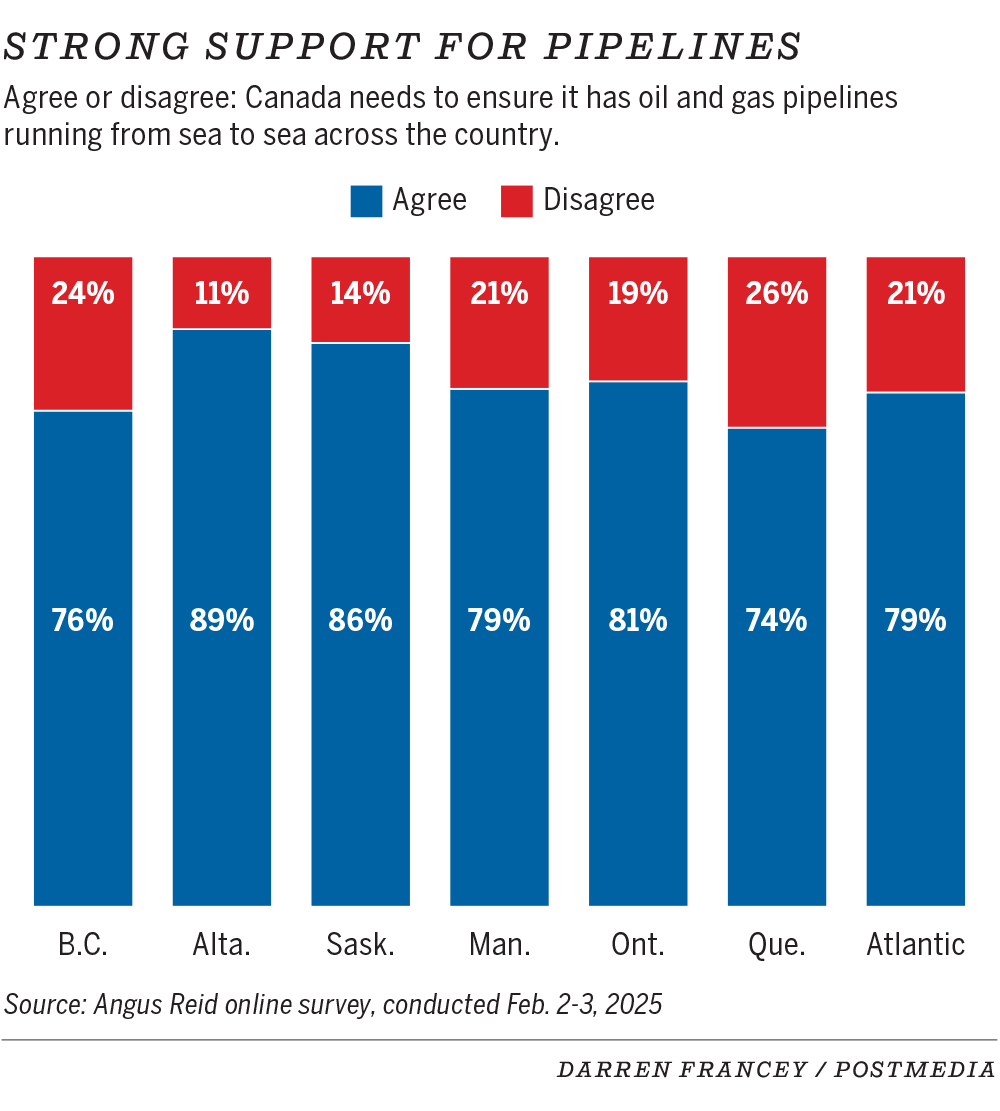Underpinning the energy issue, the poll found 91 per cent of respondents think Canada needs to reduce its reliance on the U.S. as a trading partner

It sounded like a familiar refrain from Premier Danielle Smith, extolling the need for more pipelines and LNG facilities in Canada.
Recommended Videos
“If you’re not buying oil and gas from Canada and British Columbia, the alternative is Venezuela. We believe we are a friend and an ally of the United States.”
Instead, it came from Vancouver, where British Columbia Premier David Eby called this week for increased market diversification for Canadian products that could face tariffs in the U.S.
The B.C. government also released a list of 18 major projects worth $20 billion that it wants to expedite, as it strives to advance that goal and create jobs.
They’re mainly critical mineral and electricity initiatives, but also include “energy security” projects such as the US$4-billion Cedar LNG facility and the $1.2-billion expansion of Enbridge’s Transmission-North natural gas line.
Meanwhile, a new poll finds more than seven in 10 Canadians believe the country needs to ensure oil and natural gas pipelines are running from sea to sea.
From an NDP premier in B.C. to a UCP premier in Alberta, the idea of backing major energy export developments — projects that can take up to a decade or more to approve and build — is gathering momentum as Canada seeks new markets in the face of a tariff threat from our dominant customer.
A change in the energy conversation is finally occurring, said Karen Ogen, CEO of the First Nations LNG Alliance.
“The threat of the tariffs is causing Canada, I’m hoping, to wake up,” Ogen said Tuesday while in Japan on an energy security trade mission.
“I have been doing this work for 10 years and I feel like there’s (been) no audience. Now that this threat of tariffs is upon us, Canada needs to act.”

Alberta’s premier is calling for a national effort to fast-track pipelines to all coasts and for Canada to build multiple LNG export terminals. In a statement on Wednesday, Smith said she’s encouraged by Eby’s comments.
There is global demand for Canadian resources such as oil and gas. A problem for producers, however, has been a lack of sufficient infrastructure to move more products to markets beyond the United States.
Several other projects were derailed because of regulatory and legal delays, concerns over climate effects, inadequate consultation with Indigenous communities, volatile commodity prices and government indifference — or outright obstruction.
“It doesn’t matter what the product is, we should be looking at how we get that product to other markets. Now, for pipelines, those projects — even expedited — are going to take years to put in place,” Eby told reporters on Monday.
“We have the Trans Mountain pipeline just down the road here. Using it to ensure that we can get those ships to Asian markets and not just to American markets — that we’re using the full capacity of these things to ensure our sovereignty — is critically important.”

Eby’s comments reflect a shift in public opinion, and the remark about oil from Venezuela replacing Canadian crude is often used by proponents of the sector, noted Heather Exner-Pirot, director of natural resources, energy and environment at the Macdonald-Laurier Institute.
“He has clearly become an advocate for the industry, for oil and gas extraction explicitly,” she said Wednesday.
“The zeitgeist has shifted.”
A new survey by the Angus Reid Institute backs that up.
It found 79 per cent of Canadians agree the country needs to “ensure it has oil and gas pipelines running from sea to sea across the country.”
The idea was backed by 89 per cent of Albertans, but more than seven in 10 supported the idea in every province — including Quebec and British Columbia, where opposition to pipelines has traditionally been the fiercest.
Majority support was seen among Canadians of all ages, income and education levels, according to the online poll of 1,811 Canadians, conducted on Sunday and Monday.
“It is a significant finding,” institute president Shachi Kurl said in a text. “What remains to be seen is whether this represents a moment or a movement.”
Underpinning the energy issue, the poll found 91 per cent of respondents think Canada needs to reduce its reliance on the U.S. as a trading partner.
It won’t be easy.
“Years of policies rooted in energy ignorance and centred around self-flagellation have made us poorer and vulnerable,” Eric Nuttall, a senior portfolio manager with Ninepoint Partners, wrote in a column this week in the National Post.

Asked about Quebec supporting the return of Energy East — a defunct proposal to build a 4,500-kilometre pipeline to ship oil from Western Canada to the East Coast — Premier François Legault said that kind of development wouldn’t be accepted in the province today.
“Of course, the situation, the economy and what Mr. Trump is doing may change the situation in the future. So if there’s a social acceptability, we will be open to these kind of projects,” Legault told reporters this week.
And the tariff threat isn’t fading soon.
“I think the premiers are serious about (energy projects). The reality, though . . . is any project takes time,” said De Silva, the principal of GDStrategic.
“The question I have is whether the commitment and momentum can be sustained long enough to get those projects off the ground.”
Chris Varcoe is a Calgary Herald columnist.
